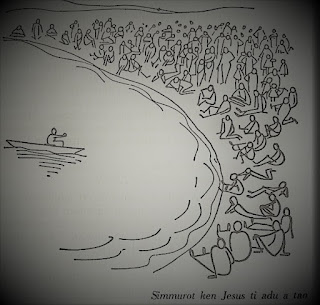Mandatum Novum on a Maundy Thursday: A New Way of Loving
“See how they love one another!"
A pagan in the 3rd century A.D. would exclaim whenever he or she saw the Christians (cf. Tertullian, Apology 39.6).
“See how they hate each other!” a pagan might say today when he or she sees Christians in our country destroying each other on social media.
The Mandatum Novum: "Love one another"
This commandment, addressed particularly to the disciples, belongs to the first part of Jesus' long Farewell Speech at the Last Supper (see 13:31 - 17:26).
It is to be the response to the new reality that is to be brought about by Jesus' passion, death, and resurrection.
That is why before Jesus pronounces the "new commandment" (mandatum novum in Latin) he speaks of his "glorification". For the writer of the Fourth Gospel, Jesus’ glorification is the one event of his passion, death, resurrection, and ascension.
The Last Supper in the Fourth Gospel
In the Gospel of John, Jesus’s last supper is not a Passover meal but happened before the Feast of Passover (13:1).
Jesus' death occurs on the same afternoon that the Passover lambs are being slaughtered (The Day of the Preparation, cf. 19:31).
There are no Eucharistic words, but Jesus spoke something similar earlier in the Bread of Life Discourse in Capernaum (esp. 6:53-56).
During the Last Supper, Jesus washes the feet of his disciples (13:2-16); he tells them, “I have given you an example that you also should do as I have done to you” (v. 15). Then Jesus gives them the mandatum novum (v. 34).
During this meal, Jesus also foretells Judas’ betrayal (vv. 21-30) and Peter’s denial (vv. 36-38). He delivers a farewell speech (13:31–16:33) and addresses a long prayer to God (17:1-26). This prayer is called today the High Priestly Prayer (a title first given by Clement of Alexandria, 5th cent.). Jesus acts like a high priest praying on behalf of his people.
What is New in the New Mandate
"I give you a new commandment, that you love one another" (13:34). What makes this commandment "new" (13:34)?
It seems this is not even original to Jesus.
In the Book of Jubilees, Jewish religious writing in 2nd cent. B.C. which reworks the materials found in Genesis and Exodus, the patriarch Isaac leaves a farewell commandment to his sons, Esau and Jacob: "Love one another, my sons, as a man loves himself, with each man seeking for his brother what is good for him . . . loving each other as themselves" (Jubilees 36:4-5).
In a similar manner, the Apostle Paul, writing around 50 A.D. exhorts the Christians in Thessalonica: "Now concerning love of the brothers and sisters, you do not need to have anyone write to you, for yourselves have been taught by God to love one another" (1 Thess 4:9).
Similar exhortations are found also in Sir 27:17; Rom 13:9; Gal 5:14; Mark 12:31.
The commandment echoes as well a much older biblical text, Lev 19:18, "You shall love your neighbor as yourself."
The Novum Testamentum in Jeremiah
The newness of this commandment can be understood better if we take into its background the theme of the "new covenant", the NOVUM TESTAMENTUM ("new testament") in Jeremiah 31:31-34.
Writing at the end of the Babylonian Exile (ca. 531 B.C.), Jeremiah (chapter 31) prophesies a reunited people of God (Israel and Judah) under a new and unbreakable covenant:
The days are surely coming, says the LORD, when I will make a new covenant with the house of Israel and the house of Judah. It will not be like the covenant that I made with their ancestors when I took them by the hand to bring them out of the land of Egypt-- a covenant that they broke, though I was their husband, says the LORD. But this is the covenant that I will make with the house of Israel after those days, says the LORD: I will put my law within them, and I will write it on their hearts; and I will be their God, and they shall be my people. No longer shall they teach one another, or say to each other, ‘Know the LORD,’ for they shall all know me, from the least of them to the greatest, says the LORD; for I will forgive their iniquity, and remember their sin no more.



Comments
Post a Comment